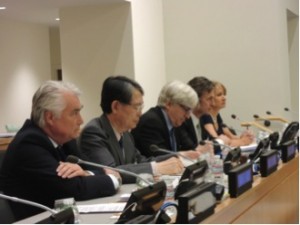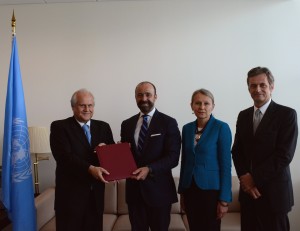

Our purpose: Promoting peace through criminal justice – preventing crimes of aggression
Through the United Nations Charter, States have expressed their commitment “to save succeeding generations from the scourge of war”. They have agreed to renounce the illegal threat or use of force, and to settle their disputes “by peaceful means in such a manner that international peace and security, and justice, are not endangered”. States have the legal duty to abide by this commitment and the UN Security Council has the primary responsibility to enforce it.The Nuremberg Trials made it clear that criminal justice also has an important role to play for the promotion of peace and the deterrence of acts of aggression – though it remained limited and theoretical for many decades thereafter. With the 2010 Kampala amendments to the Rome Statute of the International Criminal Court, States Parties created a new mechanism to enforce the most important rule of international law: the prohibition of the illegal use of force under the United Nations Charter. This website is dedicated to making accountability a reality.
News
 Swiss upper house votes for ratification of the Kampala Amendments: On 27 November, the Council of States, upper chamber of the Federal Assembly of Switzerland, approved ratification of the Kampala Amendments. Its Legal Committee had previously recommended ratification by unanimous vote. The National Council, lower chamber of the Swiss parliament, is scheduled to take up the matter in spring 2015. Switzerland thus remains on track to deposit its instrument of ratification in 2015.
Swiss upper house votes for ratification of the Kampala Amendments: On 27 November, the Council of States, upper chamber of the Federal Assembly of Switzerland, approved ratification of the Kampala Amendments. Its Legal Committee had previously recommended ratification by unanimous vote. The National Council, lower chamber of the Swiss parliament, is scheduled to take up the matter in spring 2015. Switzerland thus remains on track to deposit its instrument of ratification in 2015.
The Council of States’ press release is available in French and German.
The minutes of the Council of States’ debate on the amendments is also available online (in French and German).
 San Marino ratifies Crime of Aggression Amendments: On 14 November, San Marino became the 19th State to ratify the Kampala Amendments on the crime of aggression. San Marino had previously ratified those related to war crimes on 21 September 2011. Our campaign remains on track to achieve 30 ratifications by the end of 2015, and thus allowing for the activation of the amendments in early 2017.
San Marino ratifies Crime of Aggression Amendments: On 14 November, San Marino became the 19th State to ratify the Kampala Amendments on the crime of aggression. San Marino had previously ratified those related to war crimes on 21 September 2011. Our campaign remains on track to achieve 30 ratifications by the end of 2015, and thus allowing for the activation of the amendments in early 2017.
 Georgian Parliament approves ratification of Kampala Amendments: On 1 October 2014 the Parliament of Georgia agreed to the ratification of the Kampala Amendments to the Rome Statute. Georgia is on track to become the 18th State Party to the Kampala Amendments on the crime of aggression, and would be the seventh State in Eastern Europe (completed EEG ratifications: Croatia, Estonia, Latvia, Poland, Slovakia, Slovenia) to ratify.
Georgian Parliament approves ratification of Kampala Amendments: On 1 October 2014 the Parliament of Georgia agreed to the ratification of the Kampala Amendments to the Rome Statute. Georgia is on track to become the 18th State Party to the Kampala Amendments on the crime of aggression, and would be the seventh State in Eastern Europe (completed EEG ratifications: Croatia, Estonia, Latvia, Poland, Slovakia, Slovenia) to ratify.
 Spain, Latvia and Poland ratify Kampala amendments: At the margins of the high-level week in New York, the Foreign Ministers of Spain and Latvia and the Deputy Foreign Minister of Poland all deposited their countries’ ratification instruments of the Kampala amendments to the Rome Statute. This brings the total number of ratification to 18. 30 ratifications are required to activate the ICC’s jurisdiction over the crime of aggression. The Foreign Minister of Liechtenstein, the Director of the UN Department of Belgium and the President of the Assembly of States Parties were also present to pay tribute. The Campaign will continue to work on getting more ratifications in the upcoming months and we will keep you informed.
Spain, Latvia and Poland ratify Kampala amendments: At the margins of the high-level week in New York, the Foreign Ministers of Spain and Latvia and the Deputy Foreign Minister of Poland all deposited their countries’ ratification instruments of the Kampala amendments to the Rome Statute. This brings the total number of ratification to 18. 30 ratifications are required to activate the ICC’s jurisdiction over the crime of aggression. The Foreign Minister of Liechtenstein, the Director of the UN Department of Belgium and the President of the Assembly of States Parties were also present to pay tribute. The Campaign will continue to work on getting more ratifications in the upcoming months and we will keep you informed.
from left Tiina Intelmann (President of the Assembly of States Parties), Werner Bauwens (Director of the UN Department of Belgium), Aurelia Frick (Foreign Minister of Liechtenstein), José García-Margallo y Marfil (Foreign Minister of Spain), Edgars Rinkēvičs (Foreign Minister of Latvia), Henryka Mościcka-Dendys (Deputy Foreign Minister of Poland) and Miguel de Serpa Soares (United Nations Legal Counsel)
 Vale Hans-Peter Kaul: Hans-Peter Kaul, retired ICC judge, head of the German delegation to the Rome Conference and member of the Global Institute’s Council of Advisers, died on 21 July 2014. He leaves behind a rich and unique legacy, having had an impact on international criminal law, the International Criminal Court and the fight to criminalize the illegal use of force that will be felt for many years to come.
Vale Hans-Peter Kaul: Hans-Peter Kaul, retired ICC judge, head of the German delegation to the Rome Conference and member of the Global Institute’s Council of Advisers, died on 21 July 2014. He leaves behind a rich and unique legacy, having had an impact on international criminal law, the International Criminal Court and the fight to criminalize the illegal use of force that will be felt for many years to come.
As head of the German delegation at the Rome Conference, Judge Kaul played an instrumental role in ensuring the adoption of the Rome Statute, in safeguarding the judicial independence of the Court, and in securing the inclusion of the crime of aggression on the list of crimes over which the Court has jurisdiction. Among the first judges elected to serve on the bench of the ICC and assigned to the Pre-Trial Division, Hans-Peter contributed to the formation of the Court’s jurisprudence and was instrumental in setting up the Court’s institutions. He also remained a tireless advocate for activation of the Court’s jurisdiction over the crime of aggression.
Upon joining the Council of Advisers of the Global Institute for the Prevention of aggression, Hans-Peter made the following statement:
“It is … my firm conviction that aggressive war-making … and the use of unjustified armed force inevitably lead, time and again, to mass atrocities. I strongly believe that there can be no successful prevention of war crimes and crimes against humanity without the effective criminalisation and prosecution of aggressive war-making.”
Hans-Peter never wavered in his commitment and always persevered in his fight for the cause in which he so strongly believed. His leadership will remain exemplary. We are grateful to have worked with Hans-Peter and for the support and friendship he extended to us, and we are committed to honoring his legacy. The thoughts of all those who work on this campaign are with his wife Elisabeth.
 Expert panel discusses policy options in ratifying the Kampala amendments: At an event organized in celebration of International Justice Day, 17 July, experts discussed the policy dimension of the Kampala Amendments. Christian Wenaweser, Permanent Representative of Liechtenstein to the UN, emphasized that it was unlikely that the ICC’s focus on genocide, crimes against humanity and war crimes would change, even after the activation of the aggression amendments in 2017. Beth van Schaack, Professor at Santa Clara Law, sounded a note of caution, noting that a number of issues regarding the aggression amendments still needed to be resolved, and that States should be cautious in implementing the amendments. Focusing on Eastern Europe, Andrej Logar, Permanent Representative of Slovenia to the UN said States from the region were leaders in ratifying the Kampala Amendments. His own country had both ratified and implemented the amendments. The ICC would be ready to deal with the crime when it was activated, said Sang-Hyun Song, President of the Court, though adjustments to the rules and regulations of the Court, as well as in the budget, may become necessary.
Expert panel discusses policy options in ratifying the Kampala amendments: At an event organized in celebration of International Justice Day, 17 July, experts discussed the policy dimension of the Kampala Amendments. Christian Wenaweser, Permanent Representative of Liechtenstein to the UN, emphasized that it was unlikely that the ICC’s focus on genocide, crimes against humanity and war crimes would change, even after the activation of the aggression amendments in 2017. Beth van Schaack, Professor at Santa Clara Law, sounded a note of caution, noting that a number of issues regarding the aggression amendments still needed to be resolved, and that States should be cautious in implementing the amendments. Focusing on Eastern Europe, Andrej Logar, Permanent Representative of Slovenia to the UN said States from the region were leaders in ratifying the Kampala Amendments. His own country had both ratified and implemented the amendments. The ICC would be ready to deal with the crime when it was activated, said Sang-Hyun Song, President of the Court, though adjustments to the rules and regulations of the Court, as well as in the budget, may become necessary.
In the subsequent discussion, Spain and Poland announced that their national ratification processes were coming to an end, and that they hoped to deposit their instruments of ratification by the end of September.
Photo (from left to right): Andrej Logar (Permanent Representative of Slovenia to the UN), Sang-Hyun Song (President, ICC), David Tolbert (Moderator, President, ICTJ), Christian Wenaweser (Permanent Representative of Liechtenstein to the UN), Beth van Schaack (Professor, Santa Clara Law)
 European Parliament calls for Ratifications of the Kampala Amendments: On 17 July, in a resolution supported across party lines, the European Parliament expressed its support for the Kampala Amendments on the Crime of Aggression. In plain language, it called on EU Member States to ratify the amendments and support their activation. The EU as a whole was encouraged to develop a common position on the Crime of Aggression and to promote the ratification of the Rome Statute as amended with its external partners.
European Parliament calls for Ratifications of the Kampala Amendments: On 17 July, in a resolution supported across party lines, the European Parliament expressed its support for the Kampala Amendments on the Crime of Aggression. In plain language, it called on EU Member States to ratify the amendments and support their activation. The EU as a whole was encouraged to develop a common position on the Crime of Aggression and to promote the ratification of the Rome Statute as amended with its external partners.
The resolution was initiated by the Green MEP and member of Parliamentarians for Global Action Barbara Lochbihler who said “EU governments can play a crucial role […] by ratifying the ‘Kampala Amendment.’” This sentiment was echoed by Liechtenstein’s Ambassador to the UN, Christian Wenaweser who noted that “this decision places the amendments in the context of the campaign for universality of the Rome Statute and is a significant contribution to the acceptance of the revised Rome Statute.”
- Text of the resolution
- Parliamentarians for Global Action Press Release
- The Greens / European Free Alliance Press Release
 Austria 15th State to ratify Kampala Amendments: On 17 July, Martin Sajdik, Permanent Representative of Austria to the United Nations, deposited his country’s instrument of ratification of the Kampala Amendments. With this 15th ratification, our campaign has reached a halfway point towards the goal of achieving 30 ratifications by the end of 2015, and thus allowing for the activation of the amendments in early 2017. Austria has become the ninth Member State of the European Union to ratify the amendments.
Austria 15th State to ratify Kampala Amendments: On 17 July, Martin Sajdik, Permanent Representative of Austria to the United Nations, deposited his country’s instrument of ratification of the Kampala Amendments. With this 15th ratification, our campaign has reached a halfway point towards the goal of achieving 30 ratifications by the end of 2015, and thus allowing for the activation of the amendments in early 2017. Austria has become the ninth Member State of the European Union to ratify the amendments.
Please follow us on twitter @CrimeAggression for the latest news on this International Justice Day.
